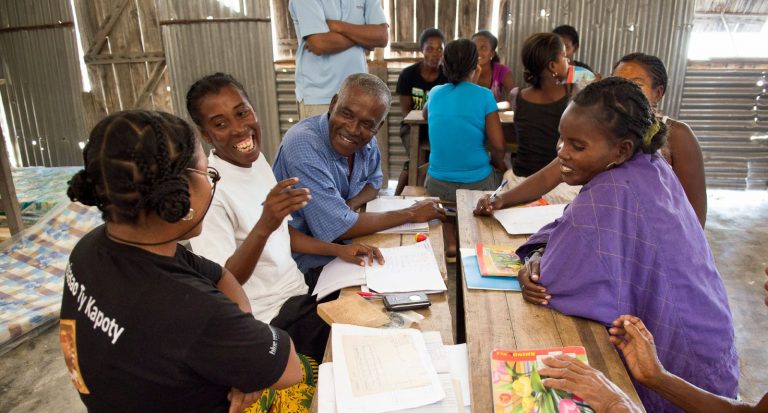New research published today in Global Environmental Change highlights the value of a holistic approach to community-based marine conservation – integrating family planning and other health services with livelihood diversification, gender equality and local marine management initiatives.
The mixed methods study was conducted in the Velondriake Locally Managed Marine Area (LMMA) in coastal southwest Madagascar where Blue Ventures has been working with communities since 2003. Quantitative and qualitative data allowed the team to examine outcomes and synergies within Blue Ventures’ health-environment programme. This in-depth research offers important new insights for those working in the global health, conservation and development sectors.
The results confirmed the value of a health-environment approach while challenging some established thinking about how it works. Family planning services were found to be highly valued by community members. Users reported experiencing better physical and mental health, being able to work and earn more, provide better for their children and focus on longer-term priorities such as better housing, savings and the future of fish stocks.
Yet family planning was not found to reduce demand for natural resources – which could support the sustainability of local conservation efforts – at least not in the short-term. Many family planning users reported using their free time to fish more – entirely understandable in a context where people are striving to raise their living standards from a very low baseline. Increasing local consumption levels here should be welcomed from an equity and poverty reduction perspective. This trend underscores the need for a truly holistic approach including complementary support for non-extractive livelihoods.
Another key finding related to women’s empowerment. The family planning component of health-environment programmes is often thought to enable women to engage more in local resource management. This was not the case for female family planning users in Velondriake: they were no more likely to attend, speak or feel they could influence decisions at local management meetings compared to non-users. Provision of contraception is clearly not all that’s needed to overcome restrictive gender norms.
“This study has challenged some long-held assumptions about how our health-environment approach works. It has also given us a deeper understanding of the interconnected challenges faced by coastal communities in southwest Madagascar – insights that we’re now applying to refine our programming and technical advice to partners.
We move forward from this research with a renewed commitment to the communities that we serve – recognising that a full constellation of human rights must be upheld in order to remove barriers to their engagement in sustainable fisheries management and marine conservation. This means strengthening livelihood diversification and gender equality initiatives alongside support for community health services.”
Laura Robson, study co-author and Blue Ventures’ Global Technical Lead for Health-Environment Partnerships
- Visit this interactive webpage showcasing the study findings
- Download the full article
- Read our learning blog
- Use this press briefing if you wish to cover the story
Please contact [email protected] for further information























